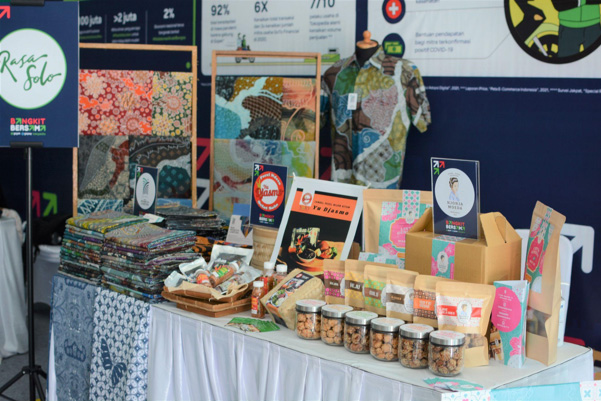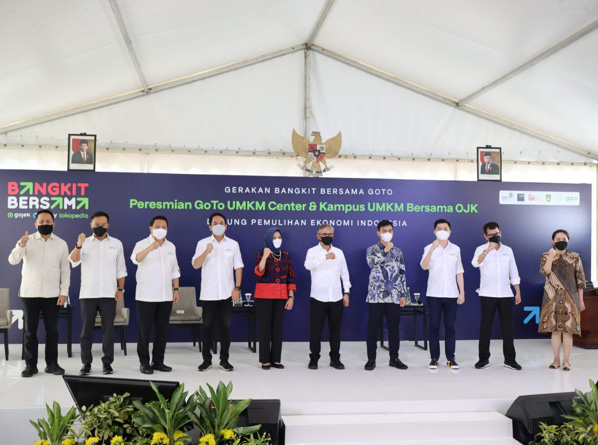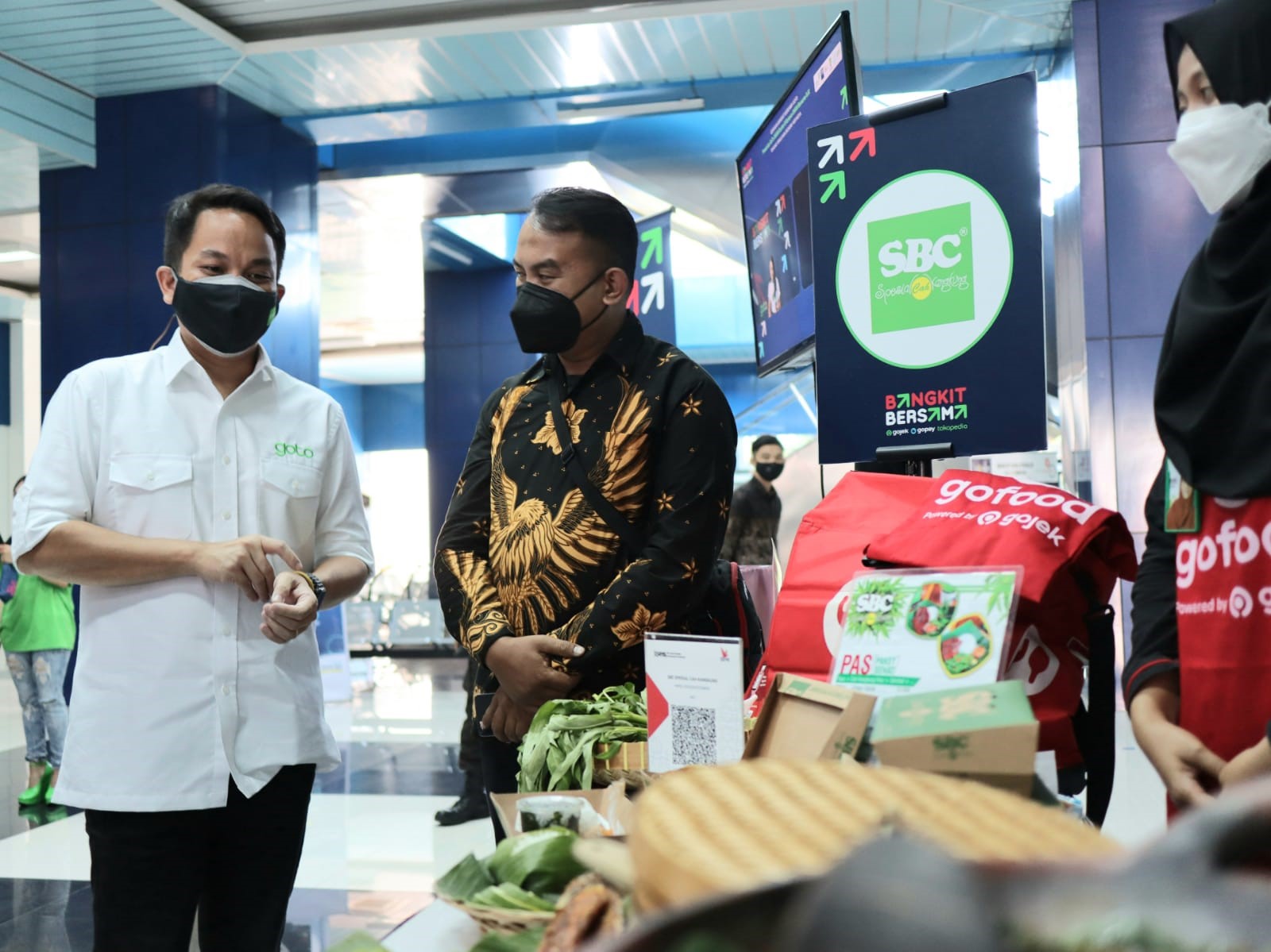As the Indonesian economy rebounds from COVID-19, it is clear that the pandemic’s effects have deeply battered the country’s burgeoning MSMEs.
A 2020 study by SMESCO found that the pandemic has negatively affected MSMEs in the culinary sector by 43.1 percent, services by 26 percent and fashion 13 percent. At the same time, MSMEs must also compete with global brands vying for the attention of Indonesian consumers.
With this in mind, GoTo, Indonesia’s most prominent technology group, has reiterated its commitment to support Indonesian MSMEs through the #BangkitBersama (#RiseTogether) campaign, a movement promoting MSME products as the premier choice for Indonesians all over the country.
The holistic initiative starts from a local level and involves MSMEs, consumers and driver-partners to create a mutually beneficial relationship within the ecosystem. GoTo has become the prime choice for MSMEs seeking to undertake the digital shift, with more than 3.8 million new MSMEs having joined Tokopedia during the pandemic. In total, 86.5 percent of Tokopedia’s 11 million sellers are first-time business owners.
#BangkitBersama is supported by the Trade Ministry, the Cooperatives and MSME Ministry, the Financial Services Authority (OJK) and regional administrations.
The #BangkitBersama campaign, along with the GoTo UMKM Center, was inaugurated in Solo Technopark, Surakarta, by OJK board of commissioners chairman Wimboh Santoso, Cooperatives and MSME Ministry deputy of entrepreneurship Siti Azizah, Surakarta Mayor Gibran Rakabuming Raka, GoTo Group and GoTo Financial CEO Andre Soelistyo, Tokopedia CEO and founder William Tanuwijaya, GoTo president commissioner Garibaldi Thohir and GoTo commissioner Wishnutama Kusubandio.
In a statement, GoTo Group and GoTo Financial CEO Andre Soelistyo said that GoTo aims to contribute to economic recovery with the spirit of collaboration and resilience.
“We saw that digitalization plays an important role in bridging offline businesses shut down by the pandemic so that they can continue to survive. GoTo is committed to continuously contributing so that MSMEs can continue their businesses by supporting their operations and management,” he said, adding that the #BangkitBersama initiative would focus on regional areas to reach more MSMEs.
Meanwhile, Tokopedia CEO and founder William Tanuwijaya observed that MSMEs have the resilience and bravery to go digital during the pandemic.
“These MSMEs have had to deal with foreign brands as well as the pandemic. At GoTo, we have a large responsibility to always be present so we can rise together,” he said.
According to William, GoTo utilizes a hyperlocal approach to build relations between local businesses and consumers so that more business owners can go digital.
“Our business is based on conscience, so our strategy at GoTo is by optimizing what’s best for our partners and MSMEs. We believe that by providing the very best for our partners, business will also grow side-by-side,” he said.
The six main initiatives of #BangkitBersama are increasing MSME exposure through a hyperlocal approach and geotagging technology, empowering MSMEs to support job creation, supporting the health and safety of driver-partners, increasing business scale through TokoCabang, CSR initiatives to give back to the community and supporting the government handling of COVID-19 in the return to normalcy.
#BangkitBersama’s initial phase will start in Surakarta, the Greater Jakarta area, Bandung, Medan, Semarang and Surabaya, with plans to expand throughout the archipelago.
Rising together with an online, hyperlocal approach
One merchant that has felt #BangkitBersama’s impact is Sista Gift Solo, specializing in handmade artisan products made by Surakarta’s MSMEs.
Founded by husband-and-wife duo Andre and Triana in 2013, Sista Gift started from Nona Bunga Solo, a home-based business that Andre’s parents first started in 1979, which he then took over in 2005.
Andre noted that while Sista Gift was founded on the notion of supporting local businesses, that support became even more urgently needed when the pandemic hit in 2020.
“During the pandemic, we were quite shocked in the early months since visitor and sales numbers were dropping. We never thought about going online since we were quite overwhelmed with offline sales, and most of our customers were the elderly who preferred going directly into our store,” he said.
Even so, the duo had to improvise quickly. As the social restrictions pushed the trend of digitalization, Sista Gift moved online, joining online marketplaces such as Tokopedia and adopting cashless payment technologies such as GoPay for offline sales. Now, a majority of Sista Gift’s sales come from online transactions.
“Sista’s sales were strong during the pandemic, and we managed not to lay off a single employee, which we’re very proud of. As the first and only e-wallet we’ve used to date, GoPay is massively helpful in terms of payment, promos and cashbacks. Our younger customers can easily complete transactions, and we also educate our older customers to make the switch as it is easier and more convenient to use,” Andre said.
“We’ve seen how technology not only helps management but also increases sales.”
Meanwhile, restaurants Palm Ethnic Resto and Maling Sego also benefited from being online during the pandemic, as owner Ayline Christianto can attest.
“During the pandemic, Palm Ethnic Resto’s visitor numbers dropped, as they were mostly dine-in customers. But the pandemic did not stop us from innovating, so we’ve undergone a rebranding with a whole new look, experience and menu,” she said.
Ayline, who has been a GoFood business partner for five years, started to optimize her sales through the app, from utilizing discounts and promotions to selling frozen food that customers can readily prepare at home.
“GoFood’s presence during the pandemic helped many MSMEs. Not only do we receive tech support from Gojek, we also receive community support through the GoFood Partners Community (KOMPAG). I often host sharing and mentoring sessions for MSMEs who want to consult online for free because I’m delighted when seeing other MSMEs continue to grow,” she said.
Ayline’s continued efforts were recognized when Palm Ethnic Resto and Maling Sego took second place in the Mitra GoFood Inspiratif 2020 at the national level. Now, she focuses on supporting the Surakarta community through a number of initiatives, including free meals for medical professionals to special promotions for vaccinated Surakartans.
“We hope that our support can bring a renewed sense of spirit and strength so that we can all #BangkitBersama. MSMEs must be able to bring change, even from the smallest things, so that we can provide a positive impact for our customers, employees and even our brand.”

For Michael Anggawinarta, the community comes above all. As the Program Manager of Surakarya, he developed the Rasa Solo program as a platform for Surakarta MSMEs to grow together.
Currently, Rasa Solo counts more than 120 MSMEs under its wings, including Onde-onde Njonja Moeda, Batik Mahkota Laweyan and Sambel Pecel Yu Djasmo.
“We feel that Solo’s MSMEs have a huge potential, so we’re here to support and provide a platform for them to grow to a national level. We founded Surakarya and Rasa Solo as a long-term platform for MSMEs to #BangkitBersama as well as provide an antidote for homesickness for Surakartans missing their hometown,” he said.
The Rasa Solo community, supported by the Surakarta administration and Tokopedia, is open to all MSMEs wishing to join. Rasa Solo supports its members’ business development, including quality control, packaging and pricing research. Currently, their combined revenue has reached hundreds of millions, which comes from Tokopedia alone.
“We focus on seasonal sales such as the previous Idul Fitri, where we sold nearly 500 packages in a month. People are also very keen on crafts made by Solo MSMEs, such as the Lebaran Sandang Semar hampers, our best-selling product in Rasa Solo. Our dream of supporting products made in Solo is heavily supported by Tokopedia, with most of our sales coming from Central Java, followed by West Java and Jakarta.”

Upskilling together to accelerate MSMEs go digital
The launch of #BangkitBersama in Surakarta was followed by the signing of the ‘Kampus UMKM Bersama’ inscription at the GoTo UMKM Center, Solo Technopark between the OJK and GoTo. The inscription marks both parties’ commitment to uplift up-and-coming MSMEs through financial literacy and upskilling.
Kampus UMKM Bersama is a collaboration between OJK, start-ups, the financial services industry and relevant stakeholders, as well as state and private universities to provide end-to-end training for certain MSME groups. As OJK’s first partner in the program, GoTo targets MSMEs focused on regional specialties, such as batik merchants for the Surakarta campus.
Andre said that as part of GoTo, GoTo Financial’s mission was to increase financial inclusion through payment and financial services as well as business solutions in the digital economy ecosystem.
“We appreciate OJK’s support for the collaboration on holistic training for local MSMEs. We believe that this will accelerate the financial digitalization of MSMEs, increasing their competitiveness and contributing to national and regional economic development,” he said.
OJK board of commissioners chairman Wimboh Santoso said that Indonesia had a large space to grow compared to other countries, thanks to its large population that can benefit from financial literacy and technological support.
“We at OJK are aware of this fact, so we aim to oversee, not limit. We also strive to bring technology to MSMEs, who we must guide and educate. Thank you to GoTo and their ecosystem for their efforts in bringing MSMEs into the digital ecosystem,” he said.



